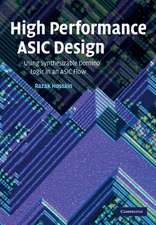Architectures for Baseband Signal Processing
Autor Frank Kienleen Limba Engleză Paperback – 22 aug 2015
in modern communications systems. Their basic principles are always derived with a focus on the resulting communications and implementation performance. As a result, this book serves as a valuable reference for two, typically disparate audiences in communication systems and hardware design.
| Toate formatele și edițiile | Preț | Express |
|---|---|---|
| Paperback (1) | 696.02 lei 6-8 săpt. | |
| Springer – 22 aug 2015 | 696.02 lei 6-8 săpt. | |
| Hardback (1) | 643.99 lei 6-8 săpt. | |
| Springer – 13 aug 2013 | 643.99 lei 6-8 săpt. |
Preț: 696.02 lei
Preț vechi: 818.85 lei
-15% Nou
Puncte Express: 1044
Preț estimativ în valută:
133.19€ • 137.40$ • 111.14£
133.19€ • 137.40$ • 111.14£
Carte tipărită la comandă
Livrare economică 27 martie-10 aprilie
Preluare comenzi: 021 569.72.76
Specificații
ISBN-13: 9781489990563
ISBN-10: 1489990569
Pagini: 280
Ilustrații: XVIII, 260 p.
Dimensiuni: 155 x 235 x 15 mm
Greutate: 0.4 kg
Ediția:Softcover reprint of the original 1st ed. 2014
Editura: Springer
Colecția Springer
Locul publicării:New York, NY, United States
ISBN-10: 1489990569
Pagini: 280
Ilustrații: XVIII, 260 p.
Dimensiuni: 155 x 235 x 15 mm
Greutate: 0.4 kg
Ediția:Softcover reprint of the original 1st ed. 2014
Editura: Springer
Colecția Springer
Locul publicării:New York, NY, United States
Cuprins
Introduction.- Digital Transmission System.- Channel Coding Basics.- Hardware Design of Individual Components.- Turbo Codes.- Low-Density Parity Check Codes.- Bit-Interleaved Coded MIMO System.- Comparing Architectures.
Notă biografică
Frank Kienle is a research team member at TU Kaiserslautern.
Textul de pe ultima copertă
This book addresses readers in electrical engineering, computer engineering, and
computer science with an interest in the field of communications engineering, architectures,
and microelectronic design. The focus is on implementation aspects and implementation constraints of individual components that are needed in transceivers for current standards, such as UMTS, LTE, WiMAX and DVB-S2. The application domain is the so called outer receiver, which comprises the channel coding, interleaving stages, modulator, and multiple antenna transmission. Throughout the book, the focus is on advanced algorithms that are actually in use
in modern communications systems. Their basic principles are always derived with a focus
on the resulting communications and implementation performance. As a result, this book serves as a valuable reference for two, typically disparate audiences in communication systems and hardware design. It addresses challenges faced by both the algorithm designer and the chip designer, who need to deal with the ongoing increase of algorithmic complexity and required data throughput for today’s mobile applications.
• Enables algorithm designers and chip designers to meet challenges posed by the ongoing increase of algorithmic complexity and required data throughput for today’s mobile applications;
• Describes techniques for improved utilization of the bandwidth, as well as maximizing area and power profile to reduce fabrication costs;
• Focuses on advanced algorithms that are actually in use in modern communications systems.
computer science with an interest in the field of communications engineering, architectures,
and microelectronic design. The focus is on implementation aspects and implementation constraints of individual components that are needed in transceivers for current standards, such as UMTS, LTE, WiMAX and DVB-S2. The application domain is the so called outer receiver, which comprises the channel coding, interleaving stages, modulator, and multiple antenna transmission. Throughout the book, the focus is on advanced algorithms that are actually in use
in modern communications systems. Their basic principles are always derived with a focus
on the resulting communications and implementation performance. As a result, this book serves as a valuable reference for two, typically disparate audiences in communication systems and hardware design. It addresses challenges faced by both the algorithm designer and the chip designer, who need to deal with the ongoing increase of algorithmic complexity and required data throughput for today’s mobile applications.
• Enables algorithm designers and chip designers to meet challenges posed by the ongoing increase of algorithmic complexity and required data throughput for today’s mobile applications;
• Describes techniques for improved utilization of the bandwidth, as well as maximizing area and power profile to reduce fabrication costs;
• Focuses on advanced algorithms that are actually in use in modern communications systems.
Caracteristici
Enables algorithm designers and chip designers to meet challenges posed by the ongoing increase of algorithmic complexity and required data throughput for today’s mobile applications Describes techniques for improved utilization of the bandwidth, as well as maximizing area and power profile to reduce fabrication costs Focuses on advanced algorithms that are actually in use in modern communications systems











